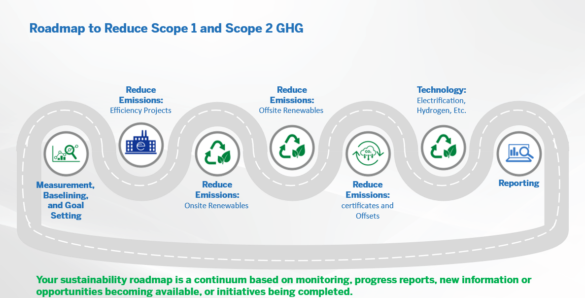Roadmap to Sustainability: Does Your Business Have a Plan in Place?
According to a 2023 Bloomberg Intelligence study, seven in 10 executives in the United States view energy-transition efforts as a competitive advantage and 75% say that failing to plan for the energy transition may expose them to revenue loss and activism1. In an effort to make strong sustainability statements, many companies are setting ambitious climate goals, such as Constellation’s commitment to achieve 100% carbon-free energy generation and 100% reduction in operational emissions by 20402.
While some businesses may have the resources onsite to plan for and integrate sustainable practices into their business strategies, others may need assistance from energy experts, such as Constellation, who can provide insights to customers about the emerging trends in sustainability and help them develop and implement an integrated strategy to meet short- or long-term goals.
What is a Sustainability Roadmap
A sustainability roadmap is a strategic plan that outlines a company’s goals and actions to become more sustainable over time. It typically involves a comprehensive assessment of a company’s current sustainability practices, identification of key sustainability issues and opportunities, and development of a plan to address those issues and opportunities.
To create a sustainability roadmap, a company may begin by conducting a sustainability audit or assessment, which involves evaluating the company’s current sustainability practices and identifying areas where improvements can be made. This may include assessing the company’s energy use, waste management, water use, supply chain practices, and other sustainability-related activities.
Once the assessment is complete, the company can use the information gathered to develop a sustainability roadmap that outlines specific goals and actions to improve its sustainability performance. This may involve setting targets for reducing energy use or greenhouse gas emissions, increasing the use of renewable energy sources, improving waste management practices, or implementing sustainable sourcing practices.
In addition to setting specific goals, a sustainability roadmap may also include a timeline for achieving those goals, as well as metrics for measuring progress along the way. It may also involve engaging stakeholders, including employees, customers, and suppliers, to ensure that sustainability is integrated throughout the organization.
Constellation can help build a customized roadmap that incorporates your goals and budgets. We can recommend a plan with a gradual transition from conventional to clean power supply with minimum risk in the desired timelines. The plan would include utilizing some of our diverse sustainability products along with a vast group of qualified channel partners with novel technologies.
Constellation Navigator, a division of Constellation, delivers customized paths and sustainable solutions for customers to set and meet their environmental and operational goals. Driven by advanced technology platforms and experienced advisors with decades of experience, it provides strategies to help organizations reduce their carbon footprints. By combining industry expertise with powerful data analytics, Constellation Navigator helps businesses solve challenges across the energy lifecycle including carbon accounting, sustainability advisory, utility bill management and rebate administration.
Once a sustainability plan is in place, the roadmap could help demonstrate the business’ commitment to sustainability.
A Sample Roadmap to Sustainability:
- Measure, Baseline and Goal Setting
The first step in your sustainability roadmap is to track GHG emissions and establish goals around Scope 1, 2 and 3 emissions.
- Scope 1: Direct emissions created from fuel consumed onsite.
- Scope 2: Indirect emissions associated with the purchase of electricity.
- Scope 3: All other emissions, including both up and downstream.
There are various types of reduction targets; Absolute, Intensity, % Renewable or % Carbon-Free, Net Zero and Science-Based Targets are the most common.
In order to set these goals, you’ll need to understand your usage, carbon footprint and other key data about your facilities.
Carbon accounting and utility bill management platforms can help you proactively identify trends and manage costs in your energy, water, sewer, and diesel expenditures. Combining your utility bill data into an easy and accessible format that provides detailed reporting on your energy usage in one convenient view allows you to develop better and more comprehensive strategies to optimize spend. The platform also creates an all-encompassing utility expense profile from your bill data across all locations in one place, making payments and data easier to manage.
Once you have a better understanding of your facility usage and have begun to develop a sustainability strategy, a carbon accounting program allows you to develop a baseline of your carbon emissions, report it across multiple frameworks, and identify and prioritize carbon reduction or offset actions you can implement. Using this tool, you will be able to proactively measure your greenhouse gas emissions, visualize your carbon footprint, and track energy efficiency projects, RECs/EFECs purchases, offsite renewable procurement, or hourly carbon-free energy matching, which will help you meet your climate goals.
- Energy Efficiency Upgrades
The U.S. Department of Energy (DOE) identifies energy efficiency as one of the easiest and most cost-effective ways to combat the climate crisis, reduce consumer energy costs and improve U.S. business competitiveness. Constellation offers consultative based energy efficiency solutions structured around efficiency, sustainability and resiliency. Energy efficiency upgrades come in the form of infrastructure improvements, such as LED lighting and HVAC upgrades. Behind-the-meter efficiency projects can directly lower GHG emissions while reducing utility bills. Technology upgrades and infrastructure improvements with energy efficiency measures can provide customers more control of energy consumption and onsite resiliency while providing sustainability benefits at the same time. These projects can also produce benefits such as operations and maintenance (O&M) cost savings and immediate and future capital cost avoidance.
Our Energy Made Efficiency (EME) program, which requires no upfront capital, is one example of Constellation’s service offerings in this area. Under this program, customers can realize cost savings by reducing energy consumption (and consequently carbon emissions), and the charges for efficiency projects appear on your energy bill. Your organization can also benefit from various rebates and incentives available from utilities and other third parties for your energy efficiency projects. These projects encompass new construction, equipment replacement and retrofit endeavors.
- The Purchase of EFECs and RECs
EFECs represent the emission-free attributes of generating sources, as defined by PJM, that do not emit greenhouse gases, such as solar, wind, nuclear and hydropower. For example, when you purchase a Carbon-Free Electricity Plan from Constellation, the electricity you purchase will be matched with EFECs sourced primarily from carbon-free nuclear generation.
RECs, on the other hand, represent the emission-free attributes of one megawatt hour (MWh) of electricity generated by a renewable energy resource, such as wind or solar.
“While investing in RECs or EFECs comes with a small incremental cost, it creates the opportunity for a business to quickly indicate to its customers and shareholders that it has started the process toward achieving sustainable practices,” says Raj Bazaj, Constellation’s executive director of retail power sales.
- Procurement of Offsite Renewables
According to the Clean Energy Buyers Association, which tracks publicly announced clean energy purchases by commercial and industrial (C&I) customers, growth in renewable energy purchases has surged to nearly 17 GW in 2022 – growth of 27% from 2021 and 172% since 2018, when Constellation first started offering customers an offsite renewable product. Customers can achieve renewable goals and make a local offsite renewable energy purchase with a retail power supply contract through our Constellation Offsite Renewables (CORe) product. Our CORe and CORe+ solutions enable customers to either integrate renewable energy purchases from existing renewable generation, including solar and wind facilities, into a load-following energy supply or support the development of new renewable energy assets on their regional grid.
- Hourly Carbon-Free Energy Matching
Currently, most net zero clean energy supplies are accounted for by matching energy use with renewable and/or emission-free energy certificates on an annual basis, without considering where or when the energy was produced. Hourly carbon-free energy matching is an opportunity to pair your electricity use with a local emission-free energy source. Utilizing hour-by-hour regional tracking, Constellation’s hourly carbon-free energy matching is the most advanced, hourly-matching application of its kind, going beyond other net zero programs that aggregate clean energy megawatts over time, and giving customers clearer and more accurate data on their electricity consumption.
Take Action Now
When it comes to setting goals for energy sustainability activities, it is critical to find the right energy solutions provider to help you navigate what can sometimes be an overwhelming and seemingly complicated process—Constellation can help ensure your organization is implementing a robust plan while staying updated and adjusting as needed to the rapidly changing landscape of new products and technologies. Learn more about our energy solutions by visiting www.constellation.com.
Sources
- https://www.bloomberg.com/company/press/bioomberg-intelligence-survey-finds-investors-and-c-suite-embrace-esg-despite-concerns/
- https://www.constellationenergy.com/our-esg-principles/environment-and-sustainability/climate-commitment.html
© 2024 Constellation. The offerings described herein, if applicable, are those of either Constellation Navigator, LLC, Constellation NewEnergy, Inc. or Constellation NewEnergy-Gas Division, LLC, affiliates of each other. Brand names and product names are trademarks or service marks of their respective holders. All rights reserved.


